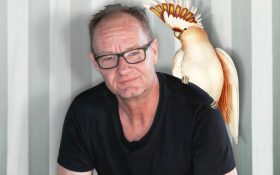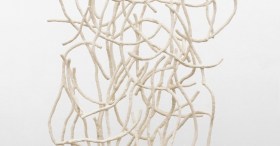Lingua Franca’s Unsustainable Behaviour will appear at ARTLANDS Festival. Photo by Phil Blatch.
Jacqui Hemsley, Director at the recently redeveloped Murray Art Museum Albury (MAMA), knows a lot about regeneration.
‘Only seven months ago, half the [MAMA] team had been working without a gallery for nearly two years and the other half had never worked in a gallery before,’ she said. Since then, the Museum has brought in 72,000 people, shown 156 programs, catered to 7,000 students and public program participants and hosted corporate hire events and conferences. ‘Acquisitions and philanthropy, [and] our collective skills and learnings have skyrocketed,’ said Hemsley.
It’s a story that is repeated across regional Australia, a new vitality that will be celebrated and explored at ARTLANDS Dubbo 2016, the biennial conference of Regional Arts Australia.
ARTLANDS Dubbo is taking as its themes regeneration, connectedness and emergence – three qualities that emphasise the strength of regional arts.
Hemsley is one of many conference guests, alongside Clive Parkinson, Director of Arts for Health at Manchester Metropolitan University (UK); David Francis, the Executive Director at the Bermagui-based Four Winds Festival; Kalgoorlie based Chair of Regional Arts Australia, Kate Fielding; Director of Opera Queensland and regional arts advocate Lindy Hume; and Wurundjeri artist Georgia MacGuire, based in the central Victorian goldfields.
Hemsley said the biennial conference is vital to the sector. ‘Professional development opportunities, networking, inspiration and collaboration are hard fought for in regional Australia; you have to want it and value the role arts and creativity have to the social and economic wellbeing of regional communities.’
Elizabeth Rogers, Chief Executive Officer, Regional Arts NSW – the host organisation for 2016 – stressed the importance of the conference for regional artists and organisations.
‘These Regional Arts Australia events are very special – all the different arts sectors come together and we want them to be inspired, we want them to start new conversations, we want them to catch up with old friends, make new friends, collaborate and network,’ she said.
ARTLANDS Festival and Fringe
ARTLANDS Dubbo is described as ‘Part Conference, Part Festival, All Arts’ and marks the first time in 14 years that NSW has hosted the biennial event. To celebrate this fact, ARTLANDS Cultural Program Director Greg Pritchard has put together a complementary festival program consisting almost entirely of artists from regional NSW.
‘I took a curatorial position that we could fill a program from within regional NSW … and unlike previous conferences I haven’t really sourced work from outside the state,’ Pritchard told ArtsHub.
The ARTLANDS Festival program has a particular focus on Indigenous artists, including the exhibition Old Land, New Marks at the Western Plains Cultural Centre, curated by Djon Mundine and spotlighting the work of NSW’S leading regional contemporary Aboriginal artists; Buried Country, a touring group of Aboriginal musicians featuring such elder statesmen of country music as Roger Knox and L.J. Hill; and a play reading by Moogahlin Theatre Company in partnership with local performers and Orana Arts.
‘Regional theatre in NSW is much stronger, from my understanding, than in other states. So we also have companies like NORPA and Outback Theatre for Young People, who are working remotely, which is exciting,’ said Pritchard.
‘We’ve also got fLiNG coming from Bega and Lingua Franca from Bathurst … and Scott Howie has put together a play from Wagga, a town that used to have a strong theatre culture, so it’s nice to see him building that up again.’
Connecting with community
ARTLANDS Fringe will spring up around the conference and festival, an opportunity for Dubbo artists and arts organisations to stage their own events and participate in the program.
The majority of festival events are free, ensuring their accessibility for locals.
‘People will be able to walk to all the venues and interact whether they’re going to the festival program or as part of the conference. There will be a buzz created around being in a fairly tightly defined three-block or four-block precinct,’ said Rogers.
Indigenous art and culture feature strongly in the conference program as well as the accompanying festival, she continued.
‘Aboriginal arts are part of our national character, our cultural identity, so we have a strong program in both the festival program and the conference program, leading national debate on Aboriginal arts and culture. And obviously it’s not going to solve all the problems of the world but certainly it’s a very strong area that we in NSW have been engaging in.’
The unique connections which exist in regional settings will also be a focus of the conference.
‘Making those collaborative partnerships between arts and health, arts and local government, arts and cultural tourism and local economic development, seem to be actually easier to develop in a smaller community than they are in much larger metropolitan areas where organisations are a little bit siloed. Working in a smaller community allows people to make those connections, even if it be in the supermarket,’ Rogers said.
All roads lead to Dubbo
Located halfway between the NSW coast and the outback, in the heart of the Great Western Plains, Dubbo is the ideal host city for the ARTLANDS conference, thanks to a diverse population and a local council who have injected in excess of $26 million into cultural infrastructure in the last decade.
‘Not only do they have a new contemporary regional art gallery but they also have an even newer contemporary theatre space. Even the local member, who happens to be the Deputy Premier, has mentioned that the building and establishment of this high-quality infrastructure in a regional city have actually changed the social dynamics of the city,’ Rogers said.
A key reason why Dubbo was chosen to host the conference is its central location and accessibility, said David Dwyer, Director, Community Services at Western Plains Regional Council.
‘We’ve got direct rails links with Sydney, we’ve got direct air links with Melbourne, Brisbane and Sydney, and in July with Newcastle, so you can fly direct from any of those cities to Dubbo. There’s bus services via Newcastle and Sydney as well … and it’s also easily accessible by road – it’s about a five hour comfortable drive from Sydney but also from anywhere else in NSW as well,’ Dwyer said.
Even the drive to Dubbo is taken into account by the ARTLANDS team. Applications are now open for artists and arts organisations in towns located along the main routes to Dubbo who wish to showcase their work to coincide with the festival program. Visit the ARTLANDS Regional page for application details.
And with over 3500 beds, ranging from backpackers and hotels to boutique and unique accommodation in the safari lodges at Western Plains Zoo, accommodation is abundant. In short, everything is in place to ensure that ARTLANDS Dubbo 2016 is not only a great success, but one that will leave a lasting legacy.
‘They don’t want to have a show that rolls into town and then rolls out and then within a week people forget about it,’ said Dwyer. ‘There’s some lasting things they want to do here, lasting memories for the community, and lasting skills they want to impart to artists and arts practitioners.’
Early bird registrations for ARTLANDS Dubbo 2016 close on 1 July 2016. Visit ARTLANDS.com.au for details.





